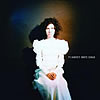I remember distinctly discovering PJ Harvey for the first time. I was about 13 years old, living in Barcelona, Spain with my family, and had had the realm of musical possibilities opened to me by my recent discovery of the Doors. I was in art class with my most favorite teacher of all time, Mr. David Magaña from Cleveland, Ohio. To Bring You My Love was playing on the stereo. An empty cassette box appeared on the table; it was clearly handwritten, recorded from a friend.
Having grown up on an aural diet of Madonna, Janet Jackson, and Ace of Base, I was instantly struck by the fact that a woman could be such a beastie when she sang. I was an instant fan.
Thirteen years later, Harvey has yet to disappoint. Her newest studio release, White Chalk, is definitely a departure from albums past; the entire thing was written and performed on the piano. Gone are the guitars, the raunchy fuzz, and vocals heavy with lustful desperation.
What we have is a record laden with sparse, simple piano measures combined with ethereal vocals that sound as if they are underwater or layered with octaves á la Tori Amos. “The Mountain” hardly sounds like the Harvey we know, she sings in her high register; brightly and clearly, reminiscent of some young pop star, until the end of the track, where her signature, soulful wailing cuts in to remind us that this is, indeed, Harvey at her best.
The title track, “White Chalk,” with its simple guitar strums, harmonica, and ghostly oooo-ing is perhaps most striking in its plaintiveness, emotional balance, and exquisite sound. “When Under Ether,” speaks plainly of staring at the ceiling, happy, fucked up on drugs.
Her subject matter is still borderline taboo and completely relatable, while her sound has evolved in a new direction; truly the benchmark of talented, successful artists.

